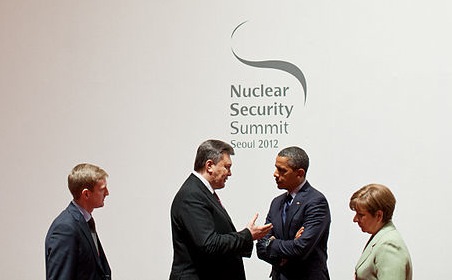Look to the Borderlands
How best can Barack Obama learn from mistakes in his foreign policy with Russia? This seems to be the important question stemming from recent articles (Vlad the Impaler by Kori Schake) and general observations displaying the American president of less than impressive dealings with Vladimir Putin and the Kremlin.
August 18, 2013 -
Ian Hansen
-
Articles and Commentary

800px-President_Barack_Obama_talks_with_President_Viktor_Yanukovych.jpg
To summarise, the article highlighted how Obama is George W. Bush revisited (“a bossy liberal”). His signature effort – the 2009 reset – has failed to usher in true transformative dialogue. The successes seem uncertain at best: negligible work on Iran, a new START treaty which left some thorny issues to resolve, expedient cooperation on terrorist threats, and access to Afghanistan – which the White House is rapidly trying to leave.
Meanwhile, Russia is becoming more belligerent. It has exacerbated the quagmire in Syria – which may be the biggest threat to American security – by continually arming Bashar al-Assad. It has shown a marked increase in demonstrative and alarming military exercises. Even when the White House abandoned the contentious phase of the missile defence shield, it garnered no favour from Russia.
None of this is surprising from a Vladimir Putin-led Russia. As early as 2010, Lilia Shevtsova argued that “where U.S. officials see dialogue, compromises, and concessions as a means of embracing and winning over the other side, the Russian elite consider dialogue, not to mention concessions, to be a sign of weakness.” Thus, despite official assurances that a lot goes on behind the scenes, it is little surprise that after talks on August 9th between American and Russian officials, the Americans “did not cite any tangible accomplishments”. The simple fact is that the reset has failed to move us, in the sense that we are closer to 1989 than 1999.
The Cold War is not about to resume, although it would be prudent for America to change the course of diplomacy with Russia. Schake’s article offered realist suggestions. Arming rebels to destabilise the Caucasus may indeed rebuke Russia, while tacitly allowing al-Assad to consolidate power in Syria may curry favour. Yet, the former seems impossible to fathom after the Boston bombings. The latter seems too great a leap to make for this government due to its public statements and its Gulf state “allies”.
The White House should focus its attention where it can confront Russia in a limited, but effective fashion. The most feasible option is Ukraine.
At the end of November, European Union Council President Lithuania will host an Eastern Partnership summit in Vilnius. A key issue is whether Ukraine will sign the Association and Free Trade Area Agreement (AA-DCFTA). Currently, it seems unlikely due to the continued imprisonment of opposition leader Yulia Tymoshenko. Yet, there are several other reasons European nations are hesitant.
The presidency of Viktor Yanukovych has been marked by an unabashed consolidation of power and cartoonish thievery. Yanukovych secured 2 million US dollars for an unwritten book of memoirs in 2012. His son Oleksandr’s wealth is now estimated at nearly 200 million dollars, although Oleksandr’s listed profession remains “dentist”. Other members of the “family” have prospered like Sergei Kurchenko, the “Gas King of All Ukraine” and recent purchaser of Ukrainian Media Holding.
Ukraine’s domestic problems appear to be getting worse. Yet, if the Obama administration wishes to demonstrate resolve in a realistic manner, there are few better opportunities than convincing its European allies to embrace Ukraine and sign the AA-DCFTA.
According to James Sherr of Chatham House, were Ukraine to sign the AA-DCFTA, it could signify the failure of the Kremlin to bring Ukraine into Putin’s strongly promoted Eurasia Customs Union and Single Economic Space. More than that, an increased amount of EU scrutiny over Ukrainian institutions, as well as anticipated surges of cultural exchanges and norms, would come at the expense of Russian influence. This would be a great defeat and message to Putin who once privately suggested that Ukraine was not even an independent nation.
The Obama administration could focus on convincing the Europeans (read: Germany, a country far less interested in reaching out to Ukraine than a country such as Poland) to make genuine progress with Ukraine. No one expects dramatic changes in Ukraine overnight. But, this is a beneficial opportunity for Europe and Ukraine in the long-term. American statecraft and diplomacy should go to great lengths to demonstrate this.
Avoiding summits is one kind of message. A much stronger message is bringing Kyiv – the fabled home of the Russian nation – onto a path away from Moscow and towards Brussels. If Barack Obama can employ the EU to move Ukraine – a country meaning borderlands – out of the Russian sphere of influence, he will have undermined one of Vladimir Putin’s core tenets. Moreover, he will have put America in a stronger bargaining place by learning from his mistakes, and pushing diplomacy to its limits.
Ian Hansen is a recent International Affairs graduate of the George Bush School of Government and Public Service at Texas A&M University. He has lived and worked in Poland, the Republic of Georgia and Ukraine.


































